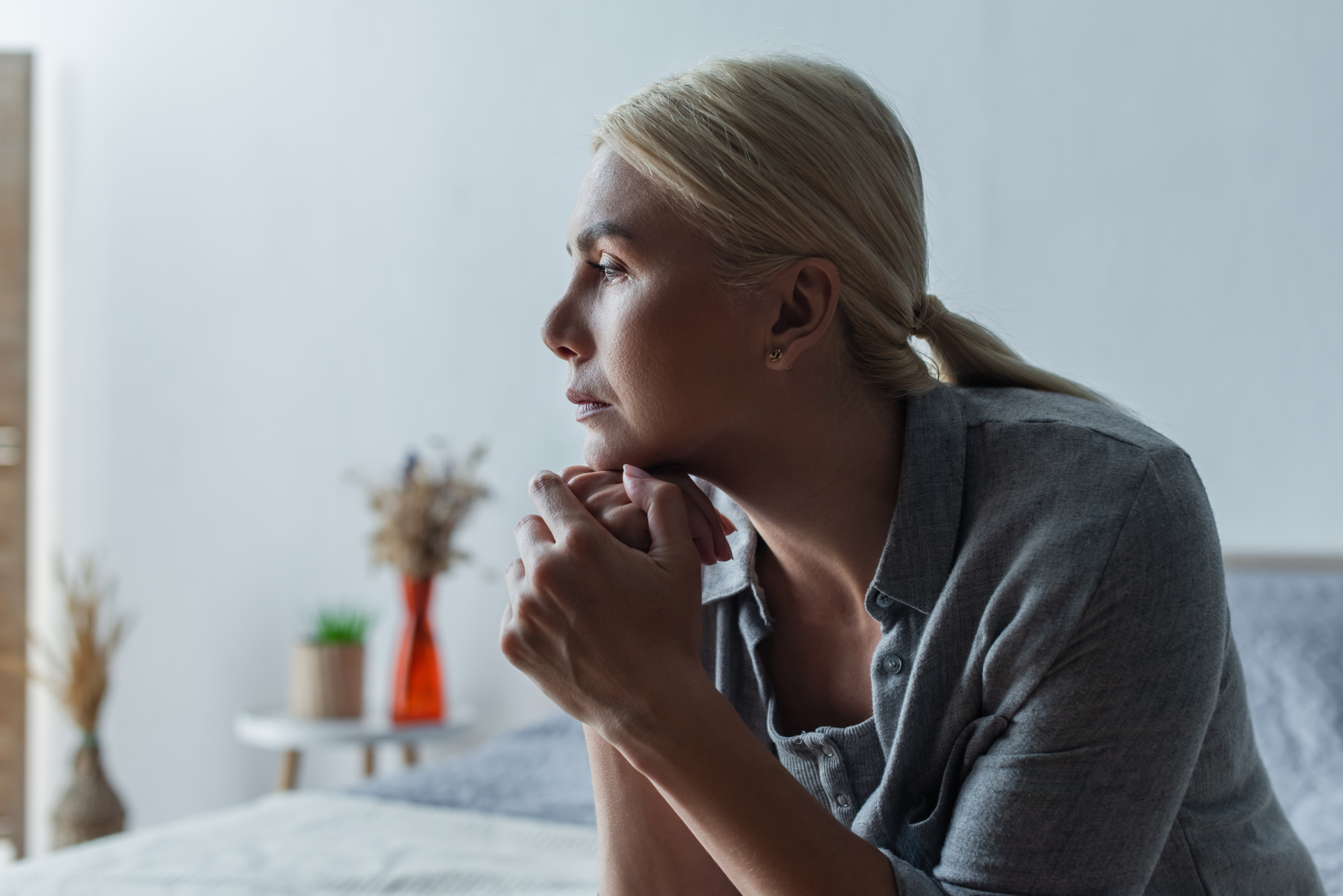Are you suffering from anxious thoughts and can’t seem to get out of your own head?
Anxiety can manifest in different ways that can keep you from enjoying your life, but when left untreated, it can wreak havoc on your mental and physical health. Anxiety symptoms can also look and feel different in women, which is why it’s important to recognize the signs of anxiety in women so you can get the help you need. In this guide, we are going to break down the signs and symptoms of anxiety in women so you can help determine if you or a loved one are suffering.
What is Anxiety?
Anxiety is a feeling of worry, nervousness, or unease. It is a normal and healthy emotion that most people commonly feel from time to time. But if you start to feel anxious regularly or feel like your anxiety is getting worse and that you can’t control it, then it could be a sign that it is a medical disorder.
If you think you are suffering from an anxiety disorder, it’s important to get the help you need and speak to a healthcare provider about it.
Women and Anxiety
Though men and women can both experience anxiety, women are more commonly likely to be diagnosed with an anxiety disorder. This is because of a combination of biological, psychological, and sociocultural factors.
According to the Anxiety and Depression Association of America, anxiety affects 18.1% of the US population of adults, and roughly 23.4% of women will be diagnosed with an anxiety disorder in their lifetime.
Women experience hormonal changes throughout their lives. Hormonal changes during the menstrual cycle, pregnancy, postpartum, and menopause can all change a woman’s hormones and influence their anxiety levels. Some women may also have a genetic disposition for anxiety disorders. On top of that, women are also more likely to experience stress and trauma from abuse or domestic violence. Having a personal history of trauma can increase your risk of developing an anxiety disorder.
Women are also more likely to internalize stress and not speak about their anxiety. Internalizing anxiety or stress can actually make the situation worse, which is why speaking to a licensed therapist about your anxiety is especially important.
Societal pressures can also play a part in anxiety. Since women tend to take on more responsibilities at home and work, they can feel stressed and experience higher levels of anxiety.
Signs and Symptoms of Anxiety
Anxiety can look and feel different in everyone, but there are some common signs of anxiety in women:
- Uncontrollable worry
- Restlessness
- Inability to relax
- Irritability
- Anger
- Difficulty concentrating
- Insomnia
- Poor quality sleep
- Panic attacks
Anxiety is a mental health disorder, but it can also cause physical symptoms that can feel scary and uncomfortable. Physical anxiety symptoms in women can include:
- Increased heart rate
- Shortness of breath
- Muscle tension
- Sweating
- Trembling or shaking
- Fatigue
- Headaches
- Digestive issues
Medications For Anxiety
You don’t have to suffer from anxiety alone. Several treatments and medications can help you manage your anxiety. Medications combined with therapy can help ease the symptoms of anxiety in women and provide you with some much-needed support.
Some medications affect the neurotransmitter serotonin in your brain to help you feel more at ease, while other medications can help control the physical symptoms of anxiety, like an increased heart rate.
Common anxiety medications include:
- Prozac (fluoxetine)
- Zoloft (sertraline)
- Lexapro (escitalopram)
- Effexor (venlafaxine)
- Cymbalta (duloxetine)
- Xanax (alprazolam)
- Ativan (lorazepam)
- Valium (diazepam)
- Inderal (propranolol)
- Buspar (buspirone)

Dual Diagnosis: Anxiety and Substance Abuse
Do you ever feel like you need to self-medicate your anxiety with drugs or alcohol? You’re not alone. Anxiety and substance abuse can often go hand in hand. Struggling with anxiety and a substance abuse disorder is also known as a dual diagnosis. Women who struggle with anxiety or have had a history of trauma may feel the need to use drugs or alcohol as a coping mechanism. This can easily lead to a dependency on as well as worsen your anxiety symptoms.
If you’re trying to figure out if you or a loved one are suffering from a co-occurring substance use disorder, symptoms may include:
- Withdrawal from friends and family
- Sudden behavioral changes
- Using substances under dangerous conditions
- Engaging in risky behaviors
- Loss of control over substance use
- Developing a tolerance to drugs
- Withdrawal symptoms like irritability, insomnia, anxiety
- Craving for substances
- Inability to function without substances
If you feel like your anxiety and substance abuse are spiraling out of control, it’s important to get the help you need as soon as possible.
Women’s Treatment For Anxiety and Substance Abuse
At New Directions for Women, we are well-equipped to treat dual diagnoses in women. We offer specialized treatments that can help with both your anxiety and your substance abuse disorder. Our approach includes cognitive behavior therapies, experiential therapies, medical detox services, relapse prevention, and group therapy. Our trained professionals can help you overcome substance addiction while finding healthy ways to treat your anxiety.
Detox
To get the most out of our rehabilitation facilities, each woman needs to be entirely sober in body and mind. Withdrawing from any substance can be scary, which is why we have medical professionals who are monitoring clients around the clock to make sure that they can comfortably detox. We want every woman to feel comfortable in our facilities, and they are also trained to help with anxiety disorders that may come up during detox. They can also prescribe medication to ease withdrawal symptoms as well as stop drug cravings.
Residential Treatment
Our residential program has multiple phases. The first phase starts following detox. Afterward, we help clients transition to residential treatment using proven therapeutic practices. The final phase is extended care. We believe that rehab should be tailored to each individual who walks into our door. Group therapy, family therapy, and other forms of therapy can also aid in the recovery process and equip each client with the self-confidence to face their dual diagnosis head-on.

Intensive Outpatient Treatment
We are proud to also offer outpatient treatment for women. We accommodate women in various stages of early recovery, with the goal being complete sobriety from drugs or alcohol, as well as providing them with coping mechanisms for their anxiety. We can accommodate various schedules and offer both all-day and partial-day programs. Our outpatient services are tailored for women living in sober communities or having a supportive friend or relative close by.
We are also passionate about tailoring each rehabilitation program to accommodate all women. Our outpatient programs can be done on a full or partial-day basis. We tailor this program to help women living in a sober community or with supportive loved ones nearby. Our staff is experienced in helping women of every population and can tailor each program to meet the needs of any woman who needs help.
Outpatient treatment is tailored to help women who live in sober living communities or have supportive loved ones nearby. Our staff is highly experienced with working with this population and can personalize their program to meet the needs of each client stepping into our facilities.
New Directions for Women Can Help

You don’t have to suffer from anxiety and substance abuse any longer. At New Directions for Women, we offer each and every woman a strong support system so they can tackle their addiction once and for all. If you or a loved one are suffering from a dual diagnosis of substance abuse and anxiety, please don’t hesitate to reach out today.
Sources:
2024 (Help Guide) Dual Diagnosis: Substance Abuse and Mental Health
2015 (National Library Of Medicine) Treatment of Co-occurring Anxiety Disorders and Substance Use Disorders
2022 (Anxiety & Depression Association of America) Women and Anxiety












